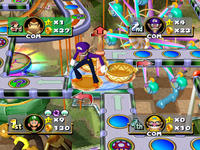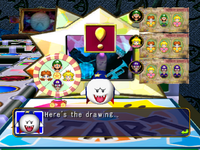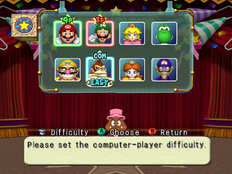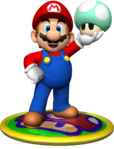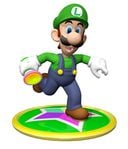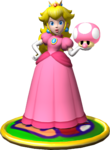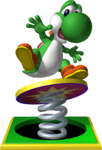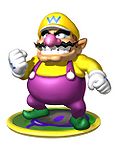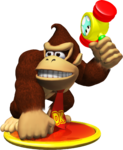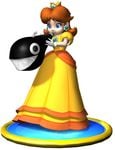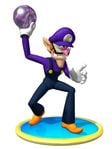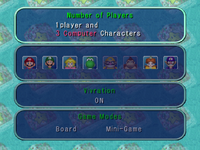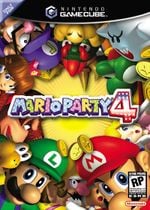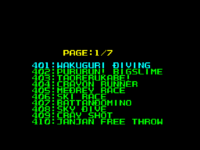Mario Party 4: Difference between revisions
JaxInvasion (talk | contribs) m (→Items: added that the sparky sticker affects anyone on the space, which is an odd detail. i wonder if it gets rid of the effects of a player with a minimega hammer?) Tag: Mobile edit |
mNo edit summary |
||
| Line 409: | Line 409: | ||
==Arcade adaptation== | ==Arcade adaptation== | ||
{{image}} | {{image|section=yes}} | ||
In 2003, an arcade game and toy manufacturer {{wp|Banpresto}} released a ''Mario Party 4''-based arcade game only in Japan called ''[[Dokidoki Mario Chance!]]'' The game had a wheel base with numbers and lights in the center of each number circle in a clockwise pattern. Each time a light would turn on, a sound would activate. On the top of the machine is a plastic case which houses a small jumping Mario figure. A Japanese voice actress and [[Charles Martinet]] provided voice acting for the game. Among Charles' lines are "Yahoo!" and "Let's-a party!" A music piece also plays throughout the gameplay. When someone loses the game, a sad sound along with more voice acting from Charles Martinet would play.<ref>[https://youtube.com/watch?v=7bEGonCjsHE]</ref> It was the last ''[[Mario (franchise)|Mario]]'' game to be made by Banpresto.<ref>[https://www.marioboards.com/index.php?topic=35637.msg1780718] Borp's coverage on Mario boards</ref> | In 2003, an arcade game and toy manufacturer {{wp|Banpresto}} released a ''Mario Party 4''-based arcade game only in Japan called ''[[Dokidoki Mario Chance!]]'' The game had a wheel base with numbers and lights in the center of each number circle in a clockwise pattern. Each time a light would turn on, a sound would activate. On the top of the machine is a plastic case which houses a small jumping Mario figure. A Japanese voice actress and [[Charles Martinet]] provided voice acting for the game. Among Charles' lines are "Yahoo!" and "Let's-a party!" A music piece also plays throughout the gameplay. When someone loses the game, a sad sound along with more voice acting from Charles Martinet would play.<ref>[https://youtube.com/watch?v=7bEGonCjsHE]</ref> It was the last ''[[Mario (franchise)|Mario]]'' game to be made by Banpresto.<ref>[https://www.marioboards.com/index.php?topic=35637.msg1780718] Borp's coverage on Mario boards</ref> | ||
Revision as of 18:05, October 17, 2021
Template:Infobox Mario Party 4 is the fourth main installment in the Mario Party series and the first for the Nintendo GameCube. Developed by Hudson Soft and published by Nintendo, the game was initially released in North America on October 21, 2002, making it the first Mario Party game to be released first outside of Japan. It retains the basic gameplay aspects from previous Mario Party titles, where up to four players roll dice to move around a board, earning coins from landing on Spaces, events, or winning mini-games played at the end of every turn to buy stars. Features introduced in previous Mario Party games such as the introduction of the usage of items from Mario Party 2 to assist players against their opponents and the ability to carry up to three items from Mario Party 3 return. New elements introduced in Mario Party 4 include the ability for players to team up in pairs in Party Mode, creating a custom mini-game pack selected entirely by players of the game, and the first Mario Party game to introduce side-collectibles in the form of presents. It is also the only Mario Party game so far to have pre-rendered cutscenes. The game is notable for introducing boards fully rendered in 3D, though the navigational board space layout remains flat until Mario Party 5. Additionally, the game completes a revamp in the 3D art direction of the Mario franchise that started with Luigi's Mansion and continued with Super Mario Sunshine. Mario Party 4 requires 2 blocks to save on the memory card, and it contains up to three save files.
Plot
"Toad, Koopa, and a whole host of party patrons have arrived on the mysterious Party Cube to celebrate your Birthday Party!"
"But giving you presents would be way too easy, so you're going to have to win the presents by playing a game or two!"
"Now let's get this party started!"
Mario and company are enjoying the outdoors when a mysterious cloud forms in the distance. As the cloud moves closer, a giant bag appears to be floating in the sky. The bag opens up to reveal Toad, Koopa, Goomba, Shy Guy, and Boo, who invite Mario and the gang to party in the Party Cube.
It's the player character's birthday and each host wants to give a present, but the character must play in each host's board and win a special mini-game to get the present. The player character manages to get every single present from each host, but Bowser shows up and threatens to steal every present the player has, unless the player agrees to go to Bowser's board and win, and the player accepts Bowser's challenge.
The player manages to win and Koopa Kid congratulates the player for winning, but Bowser tricks the player into believing that he took all of the player's presents and the two fight in a final battle. The player manages to beat Bowser and he runs away and leaves one present behind. Koopa Kid explains that Bowser never took the player's presents.
Toad then appears and said that there is still someone who didn't give their gift to the player. The lights suddenly turn off, cueing a spotlight, then Toad points to the sky and a Star is seen, zipping across the sky revealing a constellation of the character's winning pose.
The epilogue shows the five hosts without their costumes, following after the moving Party Cube. After a few seconds, the Party Cube blasts off into space, never to be seen again.
Gameplay
Mario Party 4 retains the board gameplay from previous Mario Party installments. Four players take turns to navigate around a digital game board using a Dice Block that randomly rolls numbers 1-10, within a set number of turns. Prior to starting out on a selected board, the four players need to roll a Dice Block that determines the order they will play in. Players who roll higher numbers in the beginning will start out earlier, and their HUD displayed on the corners of the screen are corresponding to what order they roll in. The overarching goal of the game is to purchase as much Stars with collected coins as possible, within the limit of turns; players first earn 10 coins to start out with. These stars cost 20 coins to purchase, and they are found in various, set locations on the board. Once a star is purchased, the star migrates to another location on the board, where players then need to navigate there to purchase again. Once all players have moved, a turn is passed and a mini-game is randomly selected from a roulette of mini-games and played; initially mini-game names are blocked out with question marks until they have been played at least once. These mini-games involve players doing actions with very specific rules under a short time limit to outperform their competition. If the players are successful by beating their opponents, they earn 10 coins as a reward, though mini-games classified as Coin mini-games (mini-games that have their text colored yellow) has the potential of players earning more coins, and they keep those coins regardless if they collected the most or not.
Spaces of various types are scattered across the board and give several effects when landed on. The most common space, the Blue Space, gives players out 3 coins if they landed on it. On the other hand, landing on a Red Space deducts 3 coins if landed on. Other spaces include Happening Spaces, Warp Spaces, Mushroom Spaces, etc. that all have their own special effect. When a space is landed on, the player panel turns to whatever color the space they landed on was. The color of the player panel dictates the type of mini-game that will be played at the end of the turn. For example, if all players land on a Blue Space, a 4-Player type mini-game will be played. If two players land on a Blue Space and two land on a Red Space, they will play a 2-vs-2 mini-game, being paired with the character who has the same color as their player panel as each other. 1-vs-3 mini-games are played if three players land on the same-colored space and one player lands on a different-colored space. If players land on a green-colored space, their player panel color will change to either blue or red randomly. Other types of mini-games are played under only special occasions; for example, Battle mini-games can be played only if players land a Battle Space and Bowser mini-games can be played if players land on a Bowser Space and Bowser decides to play the mini-game.
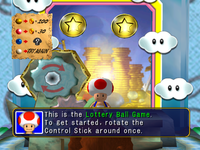
Other board features that can be accessed in all boards include Item Shops, Boo Houses, and Lottery Shops. Players can choose to enter these when they pass their space, though some of these are locked away through Gates. Some boards feature board-specific features that players that function in a similar manner to these shops such as the Mystery Train from Boo's Haunted Bash or Klepto from Shy Guy's Jungle Jam. Players earn a Lucky Party Ticket when they enter the Lottery Shop for the first time, which does not have an effect until the Last Five Turns Event.
Items can be earned when players purchase them from Item Shops, obtain them from landing on Mushroom Spaces, win them in Mini Mini-games, or through other means. Players can stash up to three items; if they carry more, they need to discard items. These items can be used to give players advantages over their opponents. A prominent feature of Mario Party 4 is the replacement of regular Mushrooms through the use of Mega and Mini Mushrooms, which can be routinely earned throughout the game. Mega Mushrooms cause the player to grow large, roll two sets of Dice Blocks, and squash opponent players for their coins. However, this causes them to ignore most board features, which includes passing by Star Spaces. Mini Mushrooms shrink players and make them roll a Dice Block numbered only 1-5, but they can travel through Gates to access areas of the map that cannot be accessed otherwise and play Mini Mini-games, which gives them the chance to earn free coins and items. In Bowser's Gnarly Party, Bowser reacts differently to characters depending on their current size. Players can earn more powerful variants of them with the Super Mega Mushroom and the Super Mini Mushroom, both of which let them roll an extra Dice Block. When players roll doubles or triples, they earn bonus coins, with 7's earning a greater number of coins, where the greatest number, rolling three 7's, rewards players with 100 coins.
A Last Five Turns Event commences when there are only five more turns in the board. The current host of the board then tallies the results of the players up and then uses a roulette to match the character mugshots on a Lucky Party Ticket, if there are any received at all. Whoever has all the matching Lucky Party Ticket character mugshots earns a free Star, though this happens very rarely. After that, the host gives the last place player a chance to stop a roulette, which affects the board's rules for the rest of the game. These include doubling the number of coins Blue Spaces give and Red Spaces take away, all Red Spaces becoming Bowser Spaces, all Red Spaces becoming Fortune Spaces, or all Stars becoming free. The game then actively notifies players of the number of turns left.
Once the final mini-game has been played, the host of the board does a final tally and announces who has the most stars and coins. If bonuses are turned on prior to starting the game, the host can additionally give out extra stars depending on if the player has fulfilled the requirements of being the best of that requirement. After the final countdown, the first place player gets rewarded as the Party Star and thus wins the game. Coins are the tiebreaker if a tie with Stars occurs, and if there is a coin tie as well, the winner is determined through a Dice Block roll. Past this, players can view statistics and results to see the overall performance, such as how many Spaces of a certain type were landed on and how many accumulated coins they won through mini-games.
Game modes
Mario Party 4 comes with six game modes. Three of the game modes are hosted by one of the five character hosts, though Toad mostly guides the player in Party Mode prior to selecting a map while Boo does not host any of the modes, unless his board is selected in Party and Story Mode. The main menu is called the "Party Cube screen", where players can pick a ticket representing the mode before entering the Party Cube.
Party Mode
The primary mode of Mario Party 4, who is hosted by Toad prior to board selection. This mode uses the default rules for game boards, where the goal is to amass the most Stars. Up to four players can participate in this mode, and there are always four players in the board; CPU players fill up slots of vacant human players. Players can select from a roster of 8 playable characters, and then adjust the difficulty of the CPU players from Easy, Normal, Hard, to the unlockable Expert. After the characters are selected, players pick a board to play on. Once a board is selected, the owner of the board becomes the overall host of the game. Players can then adjust the following settings:
- Rules: Players can either select Battle Royale, the traditional way with four players competing against each other or Team Match, a feature introduced in Mario Party 4, where players can form two teams of two. However, unlike later entries in the series, players still have their own player panel and do not share coins, though they do share items. 1-vs-3 mini-games cannot be played, and 2-vs-2 mini-games are always divided by the team set.
- Number of Turns: Players can adjust the number of terms the game will last. Players can set from 10 to 50 turns, in increments of 5.
- Mini-games: Players can set which types of mini-games will appear. Mini-games set to "All" have no restrictions, mini-games set to "Easy" will have only mini-games in the easy category appear, while "Custom" players only with the players' created set of mini-games.
- Bonus Settings: If turned on, players can find Hidden Blocks when a space is landed on that awards players coins or a Star. At the end of the game, bonus Stars are also rewarded to players based on their performance.
- Mini-Game Star: Awarded to players who have won the most coins from mini-games.
- Coin Star: Awarded to players who have amassed the most coins.
- Happening Star: Awarded to players who have landed on the most Happening Spaces.
- Handicap: Players can adjust the number of Stars each player starts out with in the beginning of the game. Up to 9 Stars can be given to any individual character.
When these settings are confirmed, the game starts. Players have access to more options when they pause the game with ![]() . In the pause screen, players additionally can see the numbers of turns they have left.
. In the pause screen, players additionally can see the numbers of turns they have left.
- Changing Control: Players can adjust control settings for each character. They can adjust the difficulty of a CPU player, turn a human character to a CPU, or turn a CPU into a human player. Through this menu, it is possible for the game to have only CPUs playing.
- Playing Mini-Games: Players can toggle the Mini-Game Explanation Screen to SHOW or DON'T SHOW. SHOW is the default setting. If DON'T SHOW is toggled, the screen is skipped and the mini-game starts immediately.
- COM Mini-Games: Players can either watch or skip mini-games with only CPU players involved.
- Mini-Game Pack: Players can set which mini-game pack to use when the Mini-Game Roulette is displayed at the end of turns and when commencing a Battle mini-game.
- Rumble Settings: Players can toggle the controller rumble feature on or off.
- Message Speed: Players can adjust the speed in which messages display, from Slow, Normal, and Fast.
- Save: There are three save settings. Players can opt not to save the game, save the game only once at the end of the current turn, or save the game at the end of every turn (the default option).
- Quit: Players quit the game and return to the Party Cube screen.
Story Mode
Story Mode serves as the game's single player mode. Here, players have to clear board maps against opponent characters and beat the hosts of the maps in their special mini-games in order to win a present from them. Presents earned through this mode are stored in the Present Room. Prior to playing, players can set the difficulty of the mode from Easy, Normal, Hard, and Auto. If the game is on the Auto setting, CPU players get progressively more difficult every time a board is completed. Additionally, players can select which type of mini-games will appear, from All, to Easy, to the Custom set the player has created. Unlike Party Mode, CPU characters are picked automatically, and the static settings are Battle Royale, 15 turns, Bonuses on, and Handicap off. If there is a save file in the Story Mode, it is represented by the player character's icon on the save file screen. If players lose to the host in their respective story mini-game, players can immediately attempt again. Once players beat all host characters of the starter maps, Koopa Kid shows up and takes the player to Bowser's Gnarly Party, a board that is unlocked once players beat Bowser in The Final Battle!, take back the stolen presents, and earn his present from his defeat.
Mini-Game Mode
This mode is hosted by Goomba, and the primary focus of the mode are the mini-games. Mini-games are unlocked whenever they are played for the first time in the game's Party and Story Modes. Up to four players can participate in this mode, and any vacant slots are filled with CPU characters with adjustable difficulties. There are four ways to play this mode:
- Play: Players have four ways of playing mini-games through this mode:
- Free Play: Players can play any mini-game they have unlocked.
- Team Play: Players split into teams and play mini-games.
- Battle Mode: Players decide how many victories in mini-games are required for a win, from 3-Match, 5-Match, to 7-Match. Players can additionally split into teams and select which types of mini-games appear in the roulette, from All, Easy, to Custom.
- Tic-Tac-Toe Mode: Players split into teams and play on a 3-by-3 board of Tic-Tac-Toe. Players put their coin on a slot they want, and win the slot when they win in the mini-game selected via roulette. Players win the game when a row or diagonal of 3 coins is made.
- List: Players view all mini-games they have unlocked.
- Custom: Players can build a custom set of mini-games for use in a variety of modes. Players need to unlock 4 4-Player mini-games, 3 2-vs-2 mini-games, 3 1-vs-3 mini-games, and 2 Battle mini-games in order to create a custom pack.
- Records: Players can view best times or high scores from mini-games that set records.
Option Room
This mode is hosted by Koopa Troopa, where players can adjust various settings, listen to the game's sounds, or view records.
- Rumble Settings: Players can turn the controller rumble feature on or off.
- Listen to Music: Players can adjust the sound settings from either stereo or mono. Players can additionally listen to the game's background music and character voice samples.
- View Records: Two types of records are stored here. Board Map records store the number of times the board was played with how many times the character used won, as well as the maximum number of coins and Stars held. Mini-Game records are stored here, where players can view best times or high scores.
Present Room
- Main article: Present Room
This mode is hosted by Shy Guy, where players can view all of the presents won in Story Mode. Other collectibles are stored here as well, including the presents won when certain times or scores are beaten in mini-games and character constellations when Story Mode is beaten with that character. Presents are sorted by character and type.
Extra Room
This mode is hosted by Thwomp, Whomp, and Ztar, where Bonus mini-games exclusive to this mode are played here. These mini-games can be played alongside two bonus boards.
- Thwomp's Backroom Ball
Thwomp hosts this multiplayer-oriented mode, where one to four players can play with a variety of settings. The settings set are similar to those set in Free Play and Team Play in Mini-Game Mode. When playing on Mega Board Mayhem and Mini Board Mad-Dash, mini-games do not appear and therefore, players stay on the board the entire game. Players initially start out playing only Mega Board Mayhem and Mini Board Mad-Dash; they unlock Challenge Booksquirm and Panel Panic as they play. The last two games listed are extended versions of other mini-games.
- Whomp's Basement Brouhaha
Whomp hosts this single-player mode, where all of the features are unique mini-games that are exclusive to this mode. There are a total of six mini-games in this mode; players start out with four mini-games and when certain mini-games are unlocked in Mini-Game Mode, two more can be unlocked.
A special mini-game that is hosted by Ztar, unlocked when all games from the above modes are unlocked. This volleyball-themed mini-game comes with its own set of rules and unlockables, as well as its own tournament mode. Additionally, some playable characters are exclusive to this mode in Mario Party 4.
Characters
Playable characters
Mario Party 4 has a total of eight playable characters, with all playable characters returning from Mario Party 3. All of these playable characters are usable from the beginning and are usable throughout all modes. While Mario Party 4 does not introduce any new playable characters, a mini-game, Beach Volley Folley, found in the Extra Mode, features additional playable characters exclusive to that mini-game. They are unlocked by playing through Battle Mode, and once Battle Mode is unlocked, those additional playable characters are usable only in Free Mode.
| red | blue | hotpink | limegreen |
|---|---|---|---|
| Mario's always been an all-around guy. Just watch out when he gets a Mega Mushroom – he really starts cruisin'! | Mario's younger brother is just wild about Mushrooms! ...But does he have any hidden abilities? | She seems to be cute and innocent, but Peach is secretly quite mischievous – watch out for her Swap Card! | Yoshi sure does love Warp Blocks! You can never tell where this unpredictable character will pop up next... |
| purple | gold | black | |
| Wario's a madman with his MiniMega Hammer. Be careful in duels, too, because he's a dueling master! | The strongest of the bunch, Donkey Kong loves his Mega Mushrooms. | A bit of a tom-boy, Daisy's a big fan of the Warp Pipe! | That Waluigi's a serious sneak! Watch out for his Sparky Sticker... |
Beach Volley Folley exclusive
Boards
| Image | Board Name | Description |
|---|---|---|
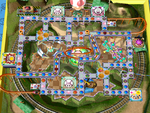
|
Toad's Midway Madness | Players have to maneuver their way around the amusement park, with the common goal being to find Toad; he is the host of the board. A notable part of this board is the tea cup rides, that, when ridden on, change direction in any junction a ride is located at. Another notable part of this board is the roller coaster, which players can take to get from the bottom-left part of the board to the top-right part and vice versa. |
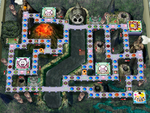
|
Shy Guy's Jungle Jam | The goal for this board is for the players to get to Shy Guy; he is the host of this board. Notable parts of this board are the Shy Guy mountain and Klepto the condor. If a player lands on a Happening Space that is located in front of a Shy Guy statue, the statue will ask for the player to make either a happy wish, or to make a sad wish. When a player passes by Klepto he asks to take the player to the bottom-right corner of the map. |
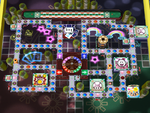
|
Goomba's Greedy Gala | Players must make sure that they manage to obtain Stars by getting to Goomba, the host of this board. The most notable feature of this board is the roulette in the very middle of it. When players pass the roulette, a Goomba asks for an optional payment of either five, ten, or twenty Coins. The more a player pays to the Goomba, the more likely it is that the ball will land on the route closest to the Star. Another notable feature of this board is the dice areas. When a player passes a dice area, a Goomba appears, rolls a number on a Dice Block, and the player has to beat that number by rolling a number higher than his. |
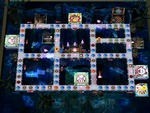
|
Boo's Haunted Bash | The main goal of this board is for the players to reach Boo; he is the host of this board. There are two notable features on this board; the Red Boo bridges, and the Mystery Train. The Red Boo bridges work in such a way that, when a player passes by the center of the board, where the leader of the Red Boos is, he and the bridges disappears, among the other Red Boos. The Mystery Train is also affected by the disappearance of the Red Boos; when the Red Boos are active, the Mystery Train is inactive and vice versa. When the Mystery Train is active and is passed by a player, it takes the player to any graveyard on the board. |
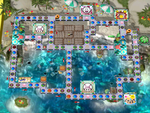
|
Koopa's Seaside Soiree | Players must make sure to make their way around the beach, with the common goal to find Koopa, as he is this board's host. A notable feature of this board is the Koopa Kabana. When a player passes the Kabana Space, said player pays five coins to Koopa. Another attraction of this board is the Dolphins, who are summoned by landing on a Happening Space that is located on a dock with a picture of a fruit on. |
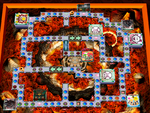
|
Bowser's Gnarly Party (unlockable) | In order for players to receive Stars on this board, they will have to get to Koopa Kid; he is the host for this board. There are two prominent features of this board; the two stone bridges, and Bowser himself. When a player crosses over a stone bridge, it will crumble apart a little. After three players cross a stone bridge, it will fully crumble apart and a new one appears in a different direction. The other feature, Bowser, reacts differently depending on the current form players have and sometimes causes additional effects to players such as turning all of them mini. |
Items
| Image | Item | Description |
|---|---|---|
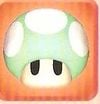
|
Mega Mushroom | The Mega Mushroom causes players to be giant and roll two Dice Blocks (for a total of 2-20 spaces). If a player rolls two matching numbers, they earn 10 coins (30 coins for two "7"'s). When players pass anyone, they steal ten coins from the player they crush. However, this item bypasses most board events (e.g. players cannot trade for any Stars on a Star Space while giant nor purchase items from the Item Shop). However, the exception is Bowser on Bowser's Gnarly Party where players that make it to him will do a Bowser mega mini-game when they pass him, due to being their mega form. |
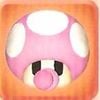
|
Mini Mushroom | The Mini Mushroom causes players to be tiny. It also restricts the Dice Block; instead of rolling 1-10, it only rolls 1-5. However, the Mini Mushroom can cause players to play Mini Mini-games; plus, they can move through Gates. |
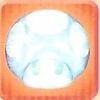
|
Super Mega Mushroom | A Super Mega Mushroom has generally the same effects as a Mega Mushroom except that players roll three Dice Blocks instead of two (for a total of 3-30 spaces). If the player rolls the same numbers (three matching numbers), they get 10 coins (30 coins for three "3"'s; 50 coins for three "7"'s). Like the Mega Mushroom, players again cannot trade for any Stars from a Star Space while giant or purchase items from the Item Shop. All events are bypassed (item shops and Star Spaces), except Bowser on Bowser's Gnarly Party. Similar to the Mega Mushroom, if they run into Bowser, they get to do a Bowser mega mini-game. |
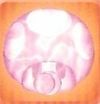
|
Super Mini Mushroom | A Super Mini Mushroom has generally the same effects as a Mini Mushroom except that players roll two 1-5 Dice Blocks instead of one (for a total of 2-10 spaces). Because both Dice Blocks only are a 1-5 Dice Block, it is possible to roll the normal number of spaces from the regular Dice Block. However, unlike the Mini Mushroom, they cannot get a total of 1 (as there are 2 Dice Blocks instead of one). The player gets 10 coins if they roll the same numbers (two matching numbers). |

|
Warp Pipe | When players use a Warp Pipe, a roulette that has the heads of the other characters appears. An arrow spins and players can stop the arrow. When the arrow stops on a character's head, the player swaps places with that character. |
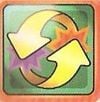
|
Swap Card | The Swap Card randomly choose another player via roulette and the player who used it swaps items with the chosen player. |

|
MiniMega Hammer | When players use a MiniMega Hammer, they may choose another player to be Mega or Mini by hitting them on the head with the hammer; but they can't inflict their own effect (Mega or Mini). Then, the opponent that player chooses is given the effects of a Mega Mushroom or a Mini Mushroom on the next turn, determined by what mushroom appears on the hammer when the alternating between the two mushrooms is stopped by pressing the A button. |
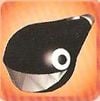
|
Chomp Call | If a Chomp Call is used, four small Chain Chomps appear, surround the host that holds the Star in the Star Space, and scare them away to another space. Afterwards, the location of the Star Space changes. |
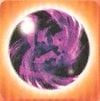
|
Boo's Crystal Ball | When a Boo Crystal Ball is used, a Boo appears and does either of the following: A) The Boo steals coins from a selected player with a five-coin fee. The victim can fight back and lose less coins by repeatedly pressing |
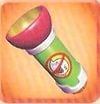
|
Gaddlight | The Gaddlight automatically lets the player chase away a Boo that is after their coins and Stars. |
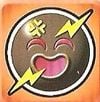
|
Sparky Sticker | When players use a Sparky Sticker, they place it directly below where they are standing. If any player tries to pass it, any player currently on said space loses 10 coins plus the effects of a Mega Mushroom or a Mini Mushroom. |

|
Item Bag | The effects of an Item Bag activate as soon as players purchase this item. They receive three random items. If they already have one or two items, the remaining items found in the bag get discarded. |

|
Magic Lamp | When players use this, they summon the Genie of the Lamp. The genie then transports them to the Star Space. However, they still must trade 20 coins for the Star. |
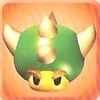
|
Bowser Suit | Players can only acquire this from Bowser when they land on a Bowser Space. If they use this, they go in a Bowser Suit. If they pass anyone else, they steal 30 coins. Like the Mega Mushroom, the Bowser Suit will bypass some board events like the Item Shops and the Star Spaces. The exception is Bowser's Gnarly Party. If the player gets to Bowser while wearing the Bowser Suit, Bowser gives the player 50 coins. |
Spaces
| Image | Space | Description |
|---|---|---|

|
Blue Space | If players land on this space, they receive three coins. On the last five turns, the coins received may double if the losing player hits the roulette wheel and has that event as a result. |

|
Red Space | If players land on this space, they lose three coins. On the last five turns, the coins lost may double if the losing player hits the roulette wheel and has that event as a result. |

|
Happening Space | If players land on this space, they trigger an event. The event varies within the board. The event may be positive or negative. |

|
Bowser Space | If players land on this space, either a Koopa Kid or Bowser appear. The Koopa Kid can take coins from either the player who landed on it or from everyone. If Bowser appears, he can cause the following events: Bowser Revolution, where he divides everyone's coins equally; Bowser Mini-game where he forces everyone to play his mini-games; Bowser Shuffle, which he randomly swaps all of the players' places; or Bowser Suit, which he gives the player a Bowser Suit. The latter event is rare. Sometimes, Bowser can come out after Koopa Kid on the same Bowser Space. |
| Fortune Space | If players land on this space, an event occurs, and they use the Reversal of Fortune, which resembles a pinball machine. The results may vary such as the player swapping stars with another or the player giving coins to the other. | |

|
Mushroom Space | If players land on this space, two boxes appear: one small, one large. The player chooses one box and may receive a Mega Mushroom or a Mini Mushroom, regardless of the size of the box. |

|
Warp Space | If players land on this space, an arrow spins on a roulette, showing the other three character's heads. The player can stop the roulette. If the arrow is pointing to one of the character's head, the space, which is actually a spring, launches the character to the chosen character. |

|
Battle Space | If players land on this space, a Bob-omb appears and starts a Battle mini-game. The player who landed on the Battle Space may choose one of two randomly selected Battle mini-games. |
Shops and other board features
| Image | Space | Description |
|---|---|---|
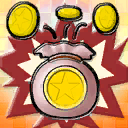
|
Lottery Shop | Players can pay five coins to play lottery games to win prizes. Upon first entering the shop prior to the Last Five Turns event, players are given a Lucky Party Ticket, where a lottery drawing will occur at the Last Five Turns for players to earn a free Star if they have a lucky ticket. The two lottery games are scratching a card and operating a machine to roll out a ball. Prizes range from coins to free items, though players have the likeliest chance of not winning anything. |
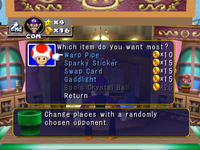
|
Item Shop | When players enter here, they can buy a single item. These shops carry up to five items, and the items vary each time the player visits the shop. Players cannot enter item shops if they have less than five coins, when they have 3 items, and when they're Mega or in a Bowser suit. |
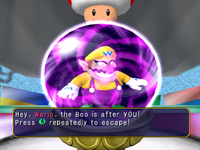
|
Boo House | Functioning similarly to a Boo's Crystal Ball, when players enter here, they can pay to enlist the services for a Boo to steal coins or Stars from an opponent. Players need to spend five coins to steal coins, while stealing Stars requires players to spend 50 coins. However if the victim has a Gaddlight, they can flash the light at Boo to scare him away when he runs after their stars and coins. |

|
Gate | Gates are pipe-like obstructions featured throughout the board. Players while normal or bigger cannot pass through them; players need to be under the effects of a Mini Mushroom to pass. When players approach them while mini, Gates function as a junction of routes. |
Mini-games
- Main article: List of Mario Party 4 minigames
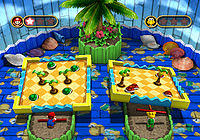
Mario Party 4 has a total of sixty mini-games, which is less than its predecessor, Mario Party 3, not counting the Mini-Mini-games that are played in the board when players are under the influence of a Mini Mushroom. It is the first Mario Party game to have fewer minigames than its predecessor. Following the removal of Duel, Item, and Game Guy mini-games, Mario Party 4 introduces new mini-game types that would become reoccurring for later games in the series. Bowser mini-games are played when a player lands on a Bowser Space and has players competing to not be the loser of the mini-game; Bowser mini-games always have a losing player and have that player burnt by Bowser. Story mini-games involve players competing against the host player though in the Mini-game Mode, the host player is replaced by the second player. etc. Mini-games are unlocked by facing off as a Mega player against Bowser and playing The Final Battle! Finally, the mini-games played exclusively in the Extra Room are counted into the total.
Staff
- Main article: List of Mario Party 4 staff
Mario Party 4 is developed by Hudson Soft, the primary developer of Mario Party installments until Mario Party 9 and the game is published by Nintendo. CAProduction is also credited with co-developing Mario Party 4, who has a consistent history of developing Mario Party titles and has strong ties to Hudson Soft and Nd Cube, the current developer for Mario Party games. The game was directed by Kenji Kikuchi, who also directed the first three Mario Party titles and Mario Party 5. The game's soundtrack was composed by Ichiro Shimakura, who composed the soundtrack for Mario Party 3.
Reception
Mario Party 4 received mostly mixed to positive reviews from critics. GameSpot's Ryan Davis praised the game's mini-game format, but noted that "players that who already exhausted themselves on the previous Mario Party titles may not have enough here to draw them back again". Eurogamer's Tom Bramwell acknowledged the variety and thematic features of the boards, but thought that they were too large, resulting in a "glacial pace" when coupled with the on-board animations. Despite this, IGN praised the boards for their thematic features on each one, which helped "ease the tediousness". New gameplay features such as the mushroom system received a negative review from multiple critics, with frustration being expressed at not being able to enter shops or purchase stars with big characters. The game's multiplayer was praised by reviews, especially in comparison to the single player mode, "Story Mode". The mini-games were mainly met with a positive reaction, with critics praising their simplicity.
| Reviews | |||
|---|---|---|---|
| Release | Reviewer, Publication | Score | Comment |
| Nintendo GameCube | Fran Mirabella III, IGN |
6.9/10 | "Mario Party 4 is exactly how you would envision it on GameCube -- all-new mini-games and better visuals. My man Waluigi has made it onto the cast list this time, which is an awesome addition, but outside of these basic upgrades, there's nothing new about Mario Party 4. It is a worthy sequel that continues to bring multiplayer fanatics a whole slew of clever mini-games. It's an absolute must-rent if you have a few friends over for the weekend. That goes for adults, family members, and kids. It's definitely an "everybody" title, and you shouldn't miss out on the diversity it has to offer. Those interested in buying would be advised that the game will collect a lot of dust if there is not a frequent crop of participants ready to partake in multiplayer matches. This will continue to be the franchise's biggest weakness unless it sees a major makeover." |
| Nintendo GameCube | Ryan Davis, GameSpot |
7.2/10 | "Since this is the fourth Mario Party game in about as many years, you'd think that the formula would have grown unbearably stale by now. But through incremental improvements and some subtle refinements, Hudson has kept the series going strong, and Mario Party 4 is arguably the most accomplished entry in the series yet. While more accomplished gamers may find some of the minigames too simplistic, this accessibility ensures that Mario's party is one that just about anyone can enjoy." |
| Nintendo GameCube | Tom "Mugwum" Bramwell, Eurogamer |
5/10 | "There's nothing bold about the moves Hudson has made with Mario Party 4. Some are reasonable additions, some are a bit daft, but most of the game is only vaguely removed from what's come before. The mini-games have different faces but they play ostensibly the same, and even with the visuals buffed to a sparkle the overall effect is very much 'more of the same'. If you have a few pals coming over for an evening, MP4 is the perfect game to wheel out, but on a system which already plays host to Super Monkey Ball, Sega Soccer Slam, Super Smash Bros. Melee and many other party-able games, it's only an also-ran. And unless you regularly have four well-palmed pads plugged into the front of your Cube, it isn't worth picking up." |
| Aggregators | |||
| Compiler | Template:Nowrap | ||
| Metacritic | 70 | ||
| GameRankings | 73.30% | ||
Sales
Mario Party 4 is the 10th best-selling game for Nintendo GameCube, with approximately 2.45 million copies sold worldwide: 1.1 million copies in North America, 902,827 copies in Japan, and 450,000 copies elsewhere, as of December 31, 2009.
Quotes
- Main article: List of Mario Party 4 quotes
- "The Star is here...for now, hee hee. Reach me without 20 coins, and you will be DENIED!" -Boo
- "I'm not so good with mushy stuff like this, but...Happy birthday. I'm, like, happy and stuff..." -Bowser
- "So, hey, I had all this space, and I made it into a casino! Pretty high-class, no?" -Goomba
- "Enjoy the laid-back atmosphere as you mellow out to my island groove and bask in its sights." -Koopa Troopa
- "I am one of the Koopa Kids! What kind of dastardly deeds can I do today?" -Koopa Kid
- "Welcome to Shy Guy's Jungle Jam! So, um, I'm Shy Guy...and I guess I'll be your host!" -Shy Guy
- "This is the Party Cube, and you're all invited!" -Toad
Pre-release and unused content
The game contains files that are named E3Setup.bin, E3SetupDLL.rel and E3SetupDLL.str. When modesel.bin in the data folder and modeseldll.rel + modeseldell.str in the dll folder are replaced by the former files, a pre-release character select screen, for E3 purposes, is shown. Donkey Kong and Wario cannot be selected.
As a placeholder, the cover art initially used for the box of Mario Party 4 used artwork of the characters from the previous game on Nintendo 64.
A debug menu was found in the game's data, and includes all the mini-games.
Glitches
If two players are on the space before the Lottery Stop and one moves forward and quickly presses ![]() on the prompt while the other one runs across, the running player may be stuck in a t-pose until their next turn.[1]
on the prompt while the other one runs across, the running player may be stuck in a t-pose until their next turn.[1]
Arcade adaptation
It has been requested that at least one image be uploaded for this section. Remove this notice only after the image(s) have been added.
In 2003, an arcade game and toy manufacturer Banpresto released a Mario Party 4-based arcade game only in Japan called Dokidoki Mario Chance! The game had a wheel base with numbers and lights in the center of each number circle in a clockwise pattern. Each time a light would turn on, a sound would activate. On the top of the machine is a plastic case which houses a small jumping Mario figure. A Japanese voice actress and Charles Martinet provided voice acting for the game. Among Charles' lines are "Yahoo!" and "Let's-a party!" A music piece also plays throughout the gameplay. When someone loses the game, a sad sound along with more voice acting from Charles Martinet would play.[2] It was the last Mario game to be made by Banpresto.[3]
Gallery
- For this subject's image gallery, see Gallery:Mario Party 4.
Yoshi, Princess Peach, Princess Daisy and Waluigi playing Butterfly Blitz
Mario, Luigi, Donkey Kong, and Yoshi playing Avalanche!
Wario and Waluigi playing The Great Deflate
Daisy, Mario, Luigi, and Wario playing GOOOOOOOAL!!
- MP4 Bowser.png
Media
- For a complete list of media for this subject, see List of Mario Party 4 media. For this subject's sound test, see Mario Party 4 sound test.
| File info 0:18 |
| File info 0:30 |
| File info 0:30 |
| File info 0:30 |
| File info 0:30 |
| File info 0:30 |
| File info 0:26 |
| File info 0:29 |
| File info 0:30 |
| File info 0:04 |
References to other games
- Mario Party 2: Bowser's Bigger Blast is a remake of Bowser's Big Blast.
- Mario Party 3: Some of the playable characters' voice clips are reused from this game, with Daisy's being pitched slightly lower than usual. "You're the Star" is a similar song to "The Adventure Ends". In Koopa's Seaside Soiree, one of the sand drawings is a cloud, which appears in every board in this game.
References in later games
- Mario Party 5: Several voice clips are reused.
- Mario Party Advance: Many songs from Mario Party 4 are remixed in Advance including the main menu theme as Advance's passport theme.
- Mario Party DS: Bob-omb Breakers returns as a puzzle minigame.
- Mario Party: The Top 100: Fourteen minigames return in this game. A cover version of the minigame completion theme plays when completing any of the fourteen Mario Party 4 minigames.
Names in other languages
| Language | Name | Meaning | Notes |
|---|---|---|---|
| Japanese | マリオパーティ4[?] Mario Pāti 4 |
Mario Party 4 | |
| Chinese (traditional) | 瑪利歐派對4[4] Mǎlì'ōu Pàiduì 4 |
Mario Party 4 |
Trivia
- This is the only Mario Party game in the series to use pre-rendered cutscenes (including the opening of this game, as well as the Story Mode endings for each playable character).
- At the end of Bowser's Gnarly Party, when Koopa Kid announces the Coin Star, there are two mistakes when he says, "This the person who collected the most coins in Mini-Games." The first mistake is that there is no "is for" in between "This" and "the". The second mistake is that this is not how the player earns the Coin Star; they earn it by having the most number of coins at one time.
References
- ^ https://twitter.com/MarioBrothBlog/status/1320437200824184835?ref_src=twsrc%5Egoogle%7Ctwcamp%5Eserp%7Ctwgr%5Etweet
- ^ [1]
- ^ [2] Borp's coverage on Mario boards
- ^ Official Chinese website for the Super Mario Bros. 35th Anniversary. Retrieved October 23, 2020.
